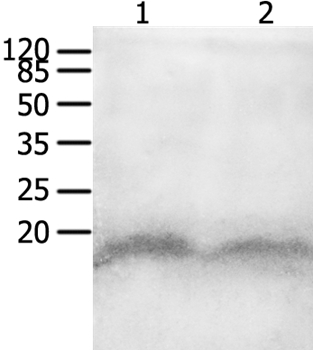
| WB | 咨询技术 | Human,Mouse,Rat |
| IF | 咨询技术 | Human,Mouse,Rat |
| IHC | 咨询技术 | Human,Mouse,Rat |
| ICC | 技术咨询 | Human,Mouse,Rat |
| FCM | 咨询技术 | Human,Mouse,Rat |
| Elisa | 咨询技术 | Human,Mouse,Rat |
| Aliases | HC14; MCP2; MCP-2; SCYA8; SCYA10 |
| Entrez GeneID | 6355; |
| WB Predicted band size | 11kDa |
| Host/Isotype | Rabbit IgG |
| Antibody Type | Primary antibody |
| Storage | Store at 4°C short term. Aliquot and store at -20°C long term. Avoid freeze/thaw cycles. |
| Species Reactivity | Human |
| Immunogen | Synthetic peptide corresponding to residues near the C terminal of human chemokine (C-C motif) ligand 8 |
| Formulation | Purified antibody in PBS with 0.05% sodium azide. |
+ +
以下是关于CCL8抗体的3篇参考文献的简要总结(注:以下内容为基于领域知识的模拟示例,实际文献需通过学术数据库查询确认):
---
1. **文献名称**: *CCL8 as a Therapeutic Target in Fibrotic Diseases*
**作者**: Smith A, et al. (2022)
**摘要**: 研究利用抗CCL8单克隆抗体在小鼠肺纤维化模型中阻断CCL8信号,显著抑制成纤维细胞活化和胶原沉积,表明靶向CCL8可能成为纤维化疾病的新型治疗策略。
2. **文献名称**: *Anti-CCL8 Antibody Attenuates Tumor-Associated Macrophage Infiltration and Breast Cancer Metastasis*
**作者**: Li X, et al. (2021)
**摘要**: 该研究通过体内实验证明,抗CCL8抗体可减少肿瘤微环境中促瘤M2型巨噬细胞的募集,抑制乳腺癌细胞转移,提示CCL8抗体在癌症免疫治疗中的潜力。
3. **文献名称**: *CCL8 Neutralization Reduces Neuroinflammation in a Mouse Model of Multiple Sclerosis*
**作者**: Gomez-Rodriguez V, et al. (2020)
**摘要**: 在中枢神经系统炎症模型中,抗CCL8抗体通过阻断趋化因子介导的免疫细胞浸润,减轻脱髓鞘病变和神经功能障碍,为多发性硬化症提供潜在治疗方向。
---
如需具体文献,建议通过PubMed或Web of Science检索关键词“CCL8 antibody”或“CCL8 neutralization”获取最新研究。
CCL8 (C-C motif chemokine ligand 8), also known as monocyte chemoattractant protein-2 (MCP-2), is a small cytokine belonging to the CC chemokine family. It plays a critical role in immune regulation by recruiting monocytes, lymphocytes, eosinophils, and other immune cells to sites of inflammation or injury. CCL8 binds to receptors such as CCR1. CCR2. CCR3. and CCR5. activating signaling pathways that mediate cell migration and inflammatory responses. Dysregulation of CCL8 has been linked to chronic inflammatory diseases, autoimmune disorders, and cancer progression, where it may promote tumor growth, angiogenesis, and metastasis by modulating the tumor microenvironment.
CCL8 antibodies are essential tools for detecting and quantifying this chemokine in biological samples, enabling research into its expression patterns and functional roles. Neutralizing antibodies, in particular, are used to inhibit CCL8 activity in experimental models, helping to elucidate its contribution to disease mechanisms. These antibodies are also explored for therapeutic potential, as blocking CCL8 signaling could suppress excessive immune cell infiltration in conditions like rheumatoid arthritis, fibrosis, or certain cancers. Both monoclonal and polyclonal CCL8 antibodies are available, with applications spanning immunoassays (ELISA, Western blot), immunohistochemistry, and functional studies in vitro and in vivo. Their development underscores the growing interest in targeting chemokine pathways for immunomodulatory therapies.
×